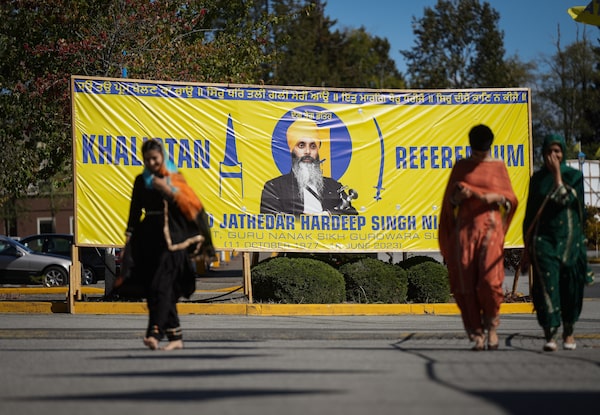
A photograph of late temple president Hardeep Singh Nijjar is seen on a banner outside the Guru Nanak Sikh Gurdwara, in Surrey, B.C., on Sept. 18.DARRYL DYCK/The Canadian Press
The last time Canada found itself in a tense geopolitical faceoff with an Asian economic powerhouse, it enjoyed ready support from allies in the U.S., Britain and Europe against China’s belligerence.
Now, Canada is locked in a worsening diplomatic feud with India over allegations that Indian agents were involved in the slaying of a Canadian citizen on Canadian soil.
But as Canada confronts India over the accusation, and watches as a trade relationship that only months ago held some promise of reversing decades of disappointment crumbles, Ottawa is unlikely to find a receptive audience in Western capitals, all of which have come to see India as a critical force to contain China’s global influence.
“I don’t doubt that Canada’s intelligence is strong, but if those countries still see India as a counterweight to China, then this episode may not change that momentum and Canada will find itself frozen out of the geopolitical alliances that are forming,” said Rohinton Medhora, former president of the Centre for International Governance Innovation.
“It will be Canada versus India and we cannot count on our allies to do anything to India to back us up.”
That has only heightened uncertainty about what this dispute could mean for the Canada-India economic relationship.
Few will argue that the relationship has lived up to its potential.
What we know about the killing of Sikh leader Hardeep Singh Nijjar
The killing of Hardeep Singh Nijjar: A timeline of events
While India is Canada’s eighth-largest trading partner, the $5.6-billion in exports shipped to India over the past year – largely made up of fossil fuels, fertilizer, wood and agricultural products – accounted for less than 19 per cent of what Canada exported to China, and less than 1 per cent of exports to the United States.
Canada’s foreign investment in India is also relatively paltry, despite large sums deployed by Canadian institutional investors and some companies. Over the past decade, roughly $21-billion of investment has flowed to India, but that’s just 0.2 per cent of Canada’s total foreign investment abroad.
Even so, a number of Canadian industries and sectors will be closely watching the dispute, which so far has led to the cancellation of Canada’s planned trade mission to India in October, as well as the suspension of talks toward a much-delayed trade agreement.
Among them is Canada’s pulse industry, which produces crops such as lentils and chickpeas.
“A potential area of vulnerability would be the imposition of arbitrary phytosanitary measures on agrifood products to exert pressure, because that has happened in the past,” said Jeff Nankivell, president and chief executive officer of the Asia Pacific Foundation.
In a statement, Pulse Canada, a national association that represents pulse growers, traders and processors, said roughly $400-million of Canadian lentils has been shipped annually to India over the past three years.
However, Jeff English, a spokesperson for Pulse Canada, said the organization would not comment on the “current bilateral relationship” between Ottawa and New Delhi.
All of the companies and business groups with exposure to India who were contacted by The Globe and Mail similarly declined to comment, a sign of the unusual circumstances that brought this dispute to the fore.
Canada’s mining sector is also bracing for possible impact from the Indo-Canadian tensions.
India accounted for 7.5 per cent of Teck Resources Ltd.’s revenue in 2022 and was the fifth-biggest market for Canada’s largest diversified mining company. The Vancouver-based miner is conducting an auction for its metallurgical coal business and among the bidders is Indian conglomerate JSW Steel.
If Teck reaches an agreement with JSW, the transaction would be subject to both a net-benefit review and a national security review by the federal government.
When asked if the current tensions would cause Ottawa to block JSW from buying Teck’s coal business, Laurie Bouchard, spokesperson for Industry Minister François-Philippe Champagne, declined comment, citing the confidentiality provisions of the Investment Canada Act.
For Saskatoon-based fertilizer giant Nutrien Ltd., India is an important export market for its potash production. India has no domestic potash production and is wholly dependent on imports.
Steve Hansen, analyst with Raymond James Ltd., said India imports about 2½ to three million tonnes of potash a year, representing about 4 per cent of the global market, and it is a major customer of Canpotex Ltd., the export organization owned by Nutrien and Tampa-based Mosaic Co., representing its third-largest international market.
Several of Canada’s largest pension funds are significant investors in India, and asset management giant Brookfield Asset Management Ltd. also holds investments in infrastructure and real estate.
Most often, the large pension funds are key backers for the construction and operation of infrastructure such as toll roads and cellphone towers, with an increasing focus on developing renewable power to help decarbonize India’s economic development.
Among the largest institutional investors in India is Canada Pension Plan Investment Board, the $575-billion fund that had more than $21-billion invested in India as of last September and has an office in Mumbai. The pension fund holds investments in Indian companies spanning banking, transportation logistics, e-commerce and other sectors; invests in the country through private equity funds; and owns stakes in office and industrial real estate.
Some pension funds have increased their focus on opportunities in India as a way of diversifying their exposure to Asia as geopolitical tensions with China rose.
Montreal-based Caisse de dépôt et placement du Québec had about $8-billion invested in India at the end of 2022, led by a team based in New Delhi. The Caisse’s investments are focused on infrastructure, including roads and renewable energy.
And a year ago, Ontario Teachers’ Pension Plan also opened an office in Mumbai in a push to get access to more investment opportunities and build long-term relationships in the country. At the time, CEO Jo Taylor highlighted India as one of the pension fund manager’s growth markets over the next five to 10 years, citing its “large, growing and dynamic economy, with openness to foreign capital.”
In 2014, insurer Fairfax Financial Holdings Ltd. began making significant investments in India through subsidiary Fairfax India Holdings Corp., which it took public in 2015. Fairfax India’s assets include a 57-per-cent stake in Bangalore’s international airport. The Toronto Stock Exchange-listed holding company has a $1.4-billion market capitalization.
Still, while the dispute unfolds, optimism about the future of Canada’s business ties to India continue to hold.
Even as federal Trade Minister Mary Ng last week postponed the trade mission to India that was meant to mark the ambitious start to Canada’s Indo-Pacific strategy, another trade mission was under way by officials from the Yukon.
As a result, Yukon Premier Ranj Pillai and his entourage, which included Victor Thomas, president of the Canada-India Business Council, were in New Delhi on Monday night as news broke that Prime Minister Justin Trudeau had accused the Indian government of helping to kill Hardeep Singh Nijjar, a Canadian citizen and supporter of an independent Sikh state in Punjab.
Mr. Pillai said his team was given no warning by the federal government that it would level its explosive allegations while they were there, though he credited the Office of the High Commission of Canada in New Delhi for supporting his team.
“My role here went from investment and talent attraction to ensuring that my team was comfortable and that I could bring down anxiety levels,” he said during a phone interview while his return flight to Canada waited to depart Tuesday night.
Despite the tense end to the trip, Mr. Pillai continues to praise the opportunity India presents as a vast market for Yukon’s critical-minerals sector and a source of potential investment as well as workers to meet shortages in its health care sector.
“Even this evening, the business community here is focused on ensuring that business continues to happen with Canada,” he said. “They see what’s happening as a significant and serious distraction.”
With a report from Andrew Willis in Toronto
The killing of a Sikh leader and Indian foreign interference
-
WHAT HAPPENED:
Hardeep Singh Nijjar, the president of a Sikh temple in Surrey, B.C. and an outspoken advocate for Sikh separatism, was shot and killed outside the gurdwara on June 18, 2023. The homicide prompted a flare-up of old tensions that have simmered since the Air India bombing involving Sikh extremists in 1985. Here is a timeline of events that led to this moment. -
ALLEGATIONS OF FOREIGN INTERFERENCE:
Three months after the shooting, Prime Minister Justin Trudeau accused Indian government agents of killing Mr. Nijjar, citing credible intelligence from Canadian national-security authorities. The Government of India denied any involvement and dismissed Mr. Trudeau’s claims as “unsubstantiated.” -
THE AFTERMATH:
Foreign Affairs Minister Mélanie Joly expelled the head of Canadian operations of India’s foreign intelligence agency. Hours later, New Delhi responded in kind, expelling an as-yet unidentified “senior Canadian diplomat.” India has also warned citizens against travelling to Canada. -
REACTION FROM CANADA’S SIKH COMMUNITY:
The World Sikh Organization of Canada, a non-profit that says it advocates for the interests of Canadian Sikhs, said it had alerted Ottawa that India actively targets Sikhs in Canada. -
THE BIGGER PICTURE:
The Nijjar slaying has cast a chill over Canada-India relations. Canada suspended talks on a trade deal with India, and Ottawa said an early October Canadian trade mission to India has been postponed. It also shines a light on how the Khalistan movement is heightening Canada-India tensions.
 Jason Kirby
Jason Kirby Niall McGee
Niall McGee James Bradshaw
James Bradshaw